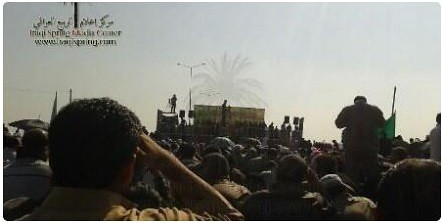Israel detains Palestinian leftist without trial
Patrick O. Strickland
 |
|
Detained without trial
since his arrest in the occupied West Bank city of Ramallah in April
2011, supporters of a left-wing Palestinian writer and academic are
nevertheless hopeful that he will be freed next month. Ahmad Qatamesh has not been charged with a crime, but Israel has repeatedly renewed his detention orders. This has drawn criticism from human rights groups including Amnesty International, which has called the 62-year-old a prisoner of conscience. "My husband has now spent a total of nine years in jail without ever being given a single charge," said Suha Barghouti, Qatamesh�s wife. "Every lawyer I�ve ever talked to about his case cannot see any law he�s broken." Between 1992 and 1998, Qatamesh was the Palestinian political prisoner held for the longest time ever under administrative detention by Israel. Under administrative detention orders, a detainee can be indefinitely held without charge or trial. No other Palestinian prisoner has spent as much time behind Israeli bars without eventually being charged, according to his wife. But now he has been detained with a new series of administrative detention orders. The latest was issued in August and expires on 28 December. Barghouti said that at a military court hearing in late August ahead of the latest renewal, "the Israeli judge accepted Ahmad�s release once the administrative detention order expired because he wasn�t convinced he is a threat." Israel�s military intelligence won an appeal, and as a result, Qatamesh�s administrative detention was extended for the seventh consecutive period of six months. If they decide to file another appeal, the judge ruled that Israel�s intelligence must provide new evidence that Qatamesh is still involved in activities deemed illegal by Israel. Barghouti described living in a state of uncertainty, never knowing if her husband will actually be sent home after an order expires. "They can renew it at any time, and sometimes they wait til the last minute," she said. The Qatamesh family�s concerns have only been deepened by reports that his health is deteriorating rapidly as he is transferred from prison to prison but never allowed proper medical treatment. Because Qatamesh is not permitted to talk to his family via telephone, Barghouti is fearful. IllnessBarghouti recently learned that the Israel Prison Service � regularly accused of systematic and far-reaching human rights violations � intends to transfer her husband from Ramon Prison in the Naqab (Negev) region to Megiddo prison, located in the north of present-day Israel."The conditions inside Megiddo are very, very bad," Barghouti explained. In February, Arafat Jaradat, who was beaten during his arrest and subsequently tortured during interrogation, died in a special segment of Megiddo used by Israel�s Shin Bet intelligence agency while being held without charge. Barghouti added, "We have a question: why�s he even being transferred? Is it to intentionally hurt his health? Other prisoners have told us, and human rights groups, that he is losing consciousness a lot." In addition to regularly fainting, Qatamesh "suffers from high blood pressure. Together they are making his health much worse," Barghouti said. She believes that her husband�s present health problems likely stem from the extensive torture he endured during his six-year detention in the 1990s; in his prison memoirs I Shall Not Wear Your Tarboush, Qatamesh describes in detail the torture and abuse he endured for more than 100 days. Because he often loses consciousness suddenly and for hours at a time, "he needs to see a serious head specialist, but as far as we know, he�s only being given Tylenol and [other] painkillers," Barghouti said. In response to Israel�s plans to transfer Qatamesh, the Palestinian prisoners� rights group Addameer filed a request that he instead be moved to Ofer military prison near Ramallah. The request was based on the grounds that Qatamesh�s court hearings are held there and family visits would be more accessible. The Israel Prison Service has yet to respond. "Maybe he�s already been transferred," Barghouti said. "Since Israel gives very little information to prisoners� families, we have no way of knowing." VisitsQatamesh�s family, like those of all Palestinian political prisoners, are forced to deal with incessant, arbitrary barriers in order to visit their loved ones."I�m only permitted to visit him once every six or eight months," Barghouti said. Only Qatamesh�s wife, daughter and sister have been allowed to visit. His brothers have been denied visitation permits time and time again. Barghouti explained that she has been denied entry into Israel or passage at checkpoints on several occasions, despite having a valid permit from Israeli authorities. "Because of this, I�ve only seen him three times in the last two and a half years," she said, adding that the most recent visit took place in September. Qatemesh�s only child, Hanin, began visiting her father in prison during his first detainment, when she was just three years old. Twenty years later, she is once more only able to see him on rare occasions. Hanin must wake up at 5:00am and travel all the way from Ramallah to Ramon, stopping and waiting for undetermined periods at the numerous Israeli military checkpoints along the way. Her mother explains that she usually doesn�t get home until 8:00pm at the earliest � all for a 45-minute conversation in which she can only see her father through a glass window and speak to him via telephone. "It�s not easy. Family visits are very complicated," said Barghouti, adding that the "conversation is difficult because you know someone is listening, that it�s being monitored." She also described the degrading and arbitrary security checks imposed on visiting relatives: "Last time the soldiers made me take off my bra before I entered. There are so many procedures. It�s humiliating, it�s difficult, and it takes a toll on a family�s soul." TargetedFollowing his first arrest in 1992, a judge ordered that Qatamesh be released for lack of evidence against him.Yet he was detained on administrative detention orders until 1998, the longest any Palestinian political prisoner has been held without trial. He was then part of a prisoner release agreement between the Palestinian Authority and Israel. Israel had accused him of being a leader in the Popular Front for the Liberation of Palestine (PFLP), a leftist political party and resistance group banned by Israel, though never charged him or brought forth evidence. Although Barghouti told The Electronic Intifada that Qatamesh hasn�t had ties to the PFLP since his 1998 release, Israel made the same accusation to justify his 2011 arrest � though without giving any evidence. In the years following his release, Qatamesh repeatedly applied for permits to travel abroad, but was always denied. Israeli military decrees also banned him from entering occupied East Jerusalem or present-day Israel. "My husband hasn�t seen Jerusalem in over thirty years," Barghouti said. During the 2011 arrest, Israeli occupation soldiers invaded Qatamesh�s home and held his family hostage at gunpoint until they were able to locate him at a relative�s house and arrest him. "They pointed their machine guns at us and told us they wanted to search the house. My 14-year-old cousin, Nai, and 69-year-old aunt were sleeping inside," Hanin, just 22 years old at the time, described in an article she wrote for the The Electronic Intifada. No supportBarghouti said her husband has been targeted for no other reason than "his ideas, writings and lectures given across the West Bank." Qatamesh has also been repeatedly interrogated about his PhD dissertation research on popular Palestinian resistance.Amnesty International agrees, stating that "Qatamesh is a political prisoner who is being detained solely for expressing nonviolent political beliefs," and calls for his release. The prisoner rights group Addameer, where Barghouti is a board member, has helped her keep her husband�s freedom campaign alive. A lawyer from the Palestinian Authority-backed Palestinian Prisoners Club has also helped. Qatamesh has also received hundreds of support letters from academics across the world. Additionally, hundreds of letters have been mailed to the Israeli government demanding his freedom, said Barghouti. The Palestinian Authority, on the other hand, has failed to match these efforts, offering Qatamesh support only "from individuals in the government who know and respect him, but not as our representative authority," Barghouti said. "No, they didn�t do anything � I�ve seen nothing from them." Although the PA struck a deal with Israel to bring home a total of 104 long-term Palestinian political prisoners � 52 of whom have already been released � there are still 5,046 Palestinians from present-day Israel, the occupied West Bank and Gaza Strip behind Israeli bars, according to Addameer�s latest statistics. Administrative detention spikesQatamesh is in the company of another 134 administrative detainees held by Israel without charge on "secret evidence," according to Addameer.International and Palestinian human rights organizations have repeatedly called on Israel to end its excessive use of administrative detention. "Israel has used its system of administrative detention � intended as an exceptional measure against people posing an extreme and imminent danger to security � to trample on the human rights of detainees for decades," Ann Harrison, deputy director of Amnesty International, said in a 2012 statement. "It is a relic that should be put out to pasture." Israel has escalated its use of administrative detention in recent weeks. In October, the administrative detention orders of 38 prisoners were extended, the Palestine News Network reported, citing the Palestinian Prisoners Society. From that total, at least fifteen will remain imprisoned at a minimum of six additional months. The culture of impunity surrounding Israeli military courts allows administrative detentions to be renewed repeatedly or even indefinitely. Acknowledging the utter lack of justice for Palestinians accused by Israel, Barghouti nonetheless expressed optimism regarding her husband�s case: "To be honest, I think he has a good chance of being released because so far there�s been no appeal. "This is the first time I�ve seen Israel�s court acknowledge that Ahmad�s not in prison for security reasons or for PFLP membership, but because he is intelligent and has influence among the people," she said. Patrick O. Strickland is an independent journalist whose reporting has appeared at Al Jazeera English, The Electronic Intifada, AlterNet and elsewhere. Follow him on Twitter: @P_Strickland_ Source |




 Green Birds
Green Birds







